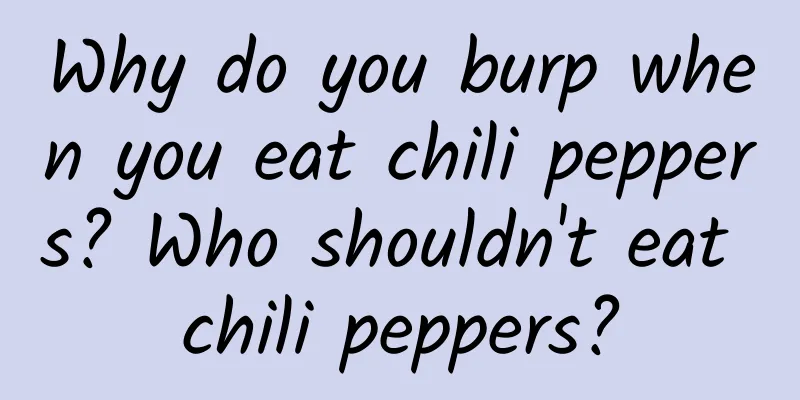Why do you burp when you eat chili peppers? Who shouldn't eat chili peppers?

|
Why do you burp after eating chili peppers? What should you do if you burp after eating chili peppers? Is it because you are not suitable for eating chili peppers? Encyclopedia Knowledge Network reminds you: When eating spicy food, don't eat too spicy food, don't eat too fast or too hard, let your body slowly adapt, and you will not easily burp. So which group of people are not suitable for eating chili peppers? Let's take you to find out today. Contents of this article 1. Why do you burp after eating chili peppers? 2. What to do if you have burps after eating chili peppers 3. Who can’t eat chili peppers? 1Why do you burp after eating chili peppers?This is because you are not very adapted to spicy food. When you are stimulated by spicy food, the diaphragm responds protectively, causing spasms and constant twitching, which manifests as hiccups. Be careful not to eat spicy food that is too spicy or too fast. Allow your body to adapt slowly and you will not easily get hiccups. 2What to do if you burp after eating chili peppers1. When you have hiccups, drink a sip or two of warm water immediately to relieve the symptoms. 2. Put a spoonful of sugar under your tongue to get immediate results. 3. Hold a mouthful of water in your mouth, and when you are about to burp, lean forward slightly and quickly swallow the water. 4. Cover your mouth and nose with a small plastic bag and take 3 to 5 deep breaths. Re-inhale the exhaled carbon dioxide to increase the concentration of carbon dioxide in the blood, regulate the nervous system, and suppress hiccups. 5. Use your fingernails to pinch the "Neiguan Point" located two horizontal fingers above the inner side of the wrist, which is also very effective in stopping hiccups. 3Who can't eat chili peppers?1. Poor heart Capsaicin in peppers can increase circulating blood volume, speed up heartbeat, and induce tachycardia. Therefore, patients with cardiovascular and cerebrovascular diseases should eat less peppers, otherwise it will hinder the improvement of their condition. 2. Poor kidney function Capsaicin is excreted through the kidneys and has a certain stimulating effect on the kidneys. If people with poor kidneys often eat spicy food, it will increase the burden on the kidneys. 3. Excessive stomach acid Capsaicin can cause increased gastric acid secretion, which can cause the gallbladder to contract, leading to spasm of the sphincter at the bile duct opening, making it difficult for bile to be discharged, thereby inducing cholecystitis, biliary colic and pancreatitis. 4. Constipation Capsaicin is irritating and can aggravate constipation symptoms. Eating it may also cause congestion and edema in hemorrhoidal veins, leading to worsening of the disease and inducing anal abscesses. 5. Oral ulcers Chili peppers are very irritating, which not only induces pain, but also irritates the ulcer surface, causing it to expand further and become chronic. 6. Patients with eye diseases If people with keratitis, conjunctivitis and other problems eat chili peppers, they may experience uncomfortable symptoms such as swollen eyelids, hot eyes and even increased intraocular pressure. 7. Hyperthyroidism Hyperthyroidism patients already have a very fast heart rate. After eating chili peppers, their heart rate will be even faster and the symptoms will be more obvious. 8. Poor gastrointestinal function If people with chronic gastritis, gastric ulcers, and esophagitis often eat spicy food, capsaicin will stimulate mucosal congestion and edema, accelerate gastrointestinal motility, and cause symptoms such as diarrhea and abdominal pain, and will also affect digestive function. 9. Taking certain medications Chili peppers not only counteract the effects of certain drugs, but may also aggravate the condition. People who are taking the following types of medicines should eat less chili peppers: Chinese medicines for clearing heat and nourishing yin (such as snake gallbladder, Chuanbei and loquat paste), skin disease medicines (such as retinoic acid ointment, etc.), gastrointestinal medicines (such as mucosal protective agents, etc.), and hemorrhoid creams (such as hemorrhoid suppositories, hemorrhoid creams, etc.). |
<<: How to store a large amount of fresh chili peppers?
>>: How to choose the hottest pepper? How to eat pepper without getting irritated
Recommend
Is it normal for leucorrhea to be sticky like snot and have no odor?
In addition to observing whether they have gyneco...
What are breast calcifications?
Nowadays, people are very concerned about their p...
Is it normal for my period to disappear after two days?
Menstruation is an issue that every woman needs t...
What is the use of red bean and barley tea? Does red bean and barley tea help defecation?
Red bean and barley tea contains a lot of vitamin...
What causes kelp to form knots? What is the function of kelp knots?
We all know that kelp is a common food. It has a ...
Exploration of the application of social data in the field of credit reporting
At the WOT "Internet +" era big data te...
What to do if bleeding occurs 25 days after transplantation
Embryo transplantation is an important method to ...
How many days does a woman's menstrual period usually last?
Menstruation is a symbol of female adulthood. Wom...
Which is less harmful, painless or painful?
Today's society is very open, and sexual cont...
Why are there pimples and itching on the inside of the labia majora?
The female labia is part of the reproductive orga...
What causes belly button pain during pregnancy
Pregnancy is a major event in life, and every exp...
What is breast nodule?
Breast disease is a type of gynecological disease...
When is the best time to travel to Mount Tai? How did the Fairy Bridge of Mount Tai get its name?
Mount Tai is the first of the "Five Mountain...
Why does the vaginal discharge increase and turn green?
There are many reasons that can cause abnormal va...
What are the signs of the first menstrual period after childbirth?
Many women will not have menstruation after pregn...









